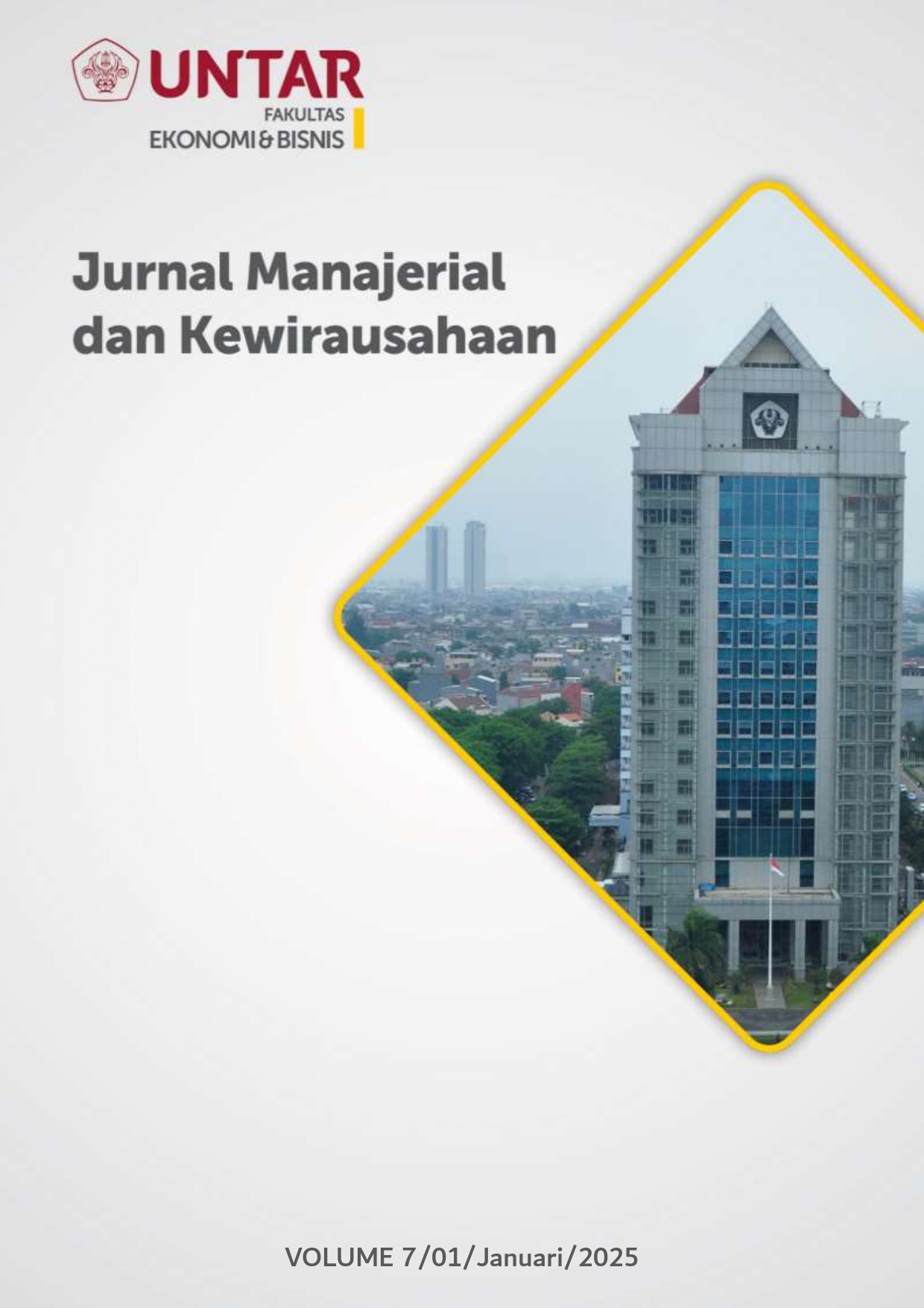Pengaruh Financial Literacy dan Financial Attitude terhadap Financial Well-Being Melalui Financial Behavior
Main Article Content
Abstract
Currently, the rate of poverty reduction and inequality in urban areas is moving slowly. As a province with a high population density, West Java still faces social inequality and welfare issues. Data from Central Bureau of Statistics West Java shows that Bogor Regency has the highest number of poor residents in West Java for the year 2024. This research was conducted with the aim of examining the effect of financial literacy and financial attitude on the financial well-being of the people of Bogor Regency, mediated by financial behavior. The population in this research consists of all residents of Bogor Regency who already have an income and have completed a bachelor's degree (S1), with a sample size of 303 people used in this research. The data analysis technique used in this research is Structural Equation Modeling (SEM) with SmartPLS version 4.1.0.8 as the software that is used to support data processing. The results of this research show that financial literacy and financial behavior have a positive effect on financial well-being, financial literacy and financial attitude have a positive effect on financial behavior, financial attitude does not affect financial well-being, and financial behavior mediates the effect of financial literacy and financial attitude on financial well-being.
Article Details
Section

This work is licensed under a Creative Commons Attribution-NonCommercial-ShareAlike 4.0 International License.
This work is licensed under a Jurnal Muara Ilmu Ekonomi dan Bisnis Creative Commons Attribution-ShareAlike 4.0 International License.,/p>
References
Ajzen, I. (1991). The Theory of Planned Behavior. Organizational Behavior and Human Decision Processes, 50(2), 179-211. https://doi.org/10.1016/0749-5978(91)90020-T
Atkinson, A. & Messy, F. (2012). Measuring Financial Literacy: Results of The Oecd. OECD Working Papers on Finance, Insurance and Private Pensions, No. 15. Retrieved September 8, 2024, from http://www.oecd-ilibrary.org/finance-and-investment/measuring-financial-literacy_5k9csfs9 0fr4-en.
Catriana, E. & Ika, A. (2022, October 7). Survei Mekari: 74 Persen Karyawan Percaya Kesejahteraan Finansial Memburuk selama Pandemi. Retrieved September 6, 2024, from https://money.kompas.com/read/2022/10/07/100000126/survei-mekari--74-persen-karyawa n-percaya-kesejahteraan-finansial-memburuk?page=all.
Badan Pusat Statistik Provinsi Jawa Barat. (2024, July 22). Jumlah penduduk miskin menurut kabupaten/kota (ribu jiwa), 2023-2024. Retrieved September 18, 2024, from https://jabar.bps.go.id/id/statistics-table/2/ODMjMg==/jumlah-penduduk-miskin.html.
Hendarto, Y. M. (2024, July 17). Survei piklada 2024: tantangan kesejahteraan di Jabar (13). Retrieved September 8, 2024, from https://www.kompas.id/baca/riset/2024/ 07/17/survei-pilkada-2024-tantangan-kesejahteraan-di-jawa-barat-13.
Kurniawati, A. A., & Lestari, H. S. (2022). Faktor-faktor yang mempengaruhi financial well-being. Jurnal Ilmiah Manajemen Bisnis dan Inovasi Universitas Sam Ratulangi, 9(3), 1577-1598.
Lavonda, P., Setyawan, I. R., & Ekadjadja, M. (2021). Determinants of Financial Well-Being among Young Workers in Jakarta during the Covid-19 Pandemic. Jurnal Ekonomi, 26(2), 295-310. https://doi.org/10.24912/je.v26i2.752
Manalo, R. A., Uy, C., & Bayona, S. P. (2024). Factors affecting financial well-being of Filipino basic education teachers: a structural equation model. Review of Integrative Business and Economics Research, 13(2), 123-141.
Megananda, T. B., & Faturohman, T. (2022). Improving financial well-being in Indonesia: the mediating role of financial behavior. Review of Integrative Business and Economics Research, 11(4), 201-219.
Novangelo, B., Adinata, M. F., Lestari, H. S., & Leon, F. M. (2022). Karakteristik demografis yang mempengaruhi kesejahteraan finansial: analisis multi kelompok investor. Jurnal Ilmiah Manajemen Bisnis dan Inovasi Universitas Sam Ratulangi, 9(1), 243-255.
Pratama, J. & Widoatmodjo, S. (2023). Faktor Determinan pada Financial Well Being Pekerja Dewasa di Jakarta. Jurnal Manajemen Bisnis dan Kewirausahaan, 7(5), 1022-1034. https://doi.org/10.24912/jmbk.v7i5.26503
Quibra, R. K. (2024). Financial knowledge, behavior, and attitude on the financial well-being of the sustainable livelihood program associations. Revista de Gestão Social e Ambienta, 18(8), 1-17.
Sabri, M. F., Anthony, M. Law, S. H., Rahim, H. A., Burhan, N. A. S., & Ithnin, M. (2023). Impact of financial behavior on financial well-being: evidence among young adults in Malaysia. Journal of Financial Services Marketing, 29(3), 788-807.
Saidah, A., Purnamawati, & Gitayuda, M. B. S. (2024). The influence of financial literacy and financial behavior on the financial wellbeing of umkm players in the tourism sector in madura. Jurnal Penelitian Ilmu Manajemen, 9(1), 1-9.
Sajuyigbe, A. S., Adegun, E. A., Adeyemi, F., Johnzon, A. A., Oladapo, J. T., & Jooda, D. T. (2024). The interplay of financial literacy on the financial behavior and well-being of young adults: evidence from nigeria. Jurnal Ilmu Ekonomi Terapan. 9(1), 120-136.
Sang, N. M. (2021). Financial well-being of vietnamese students. Investment Management and Financial Innovations, 18(4), 355-365.
Setiawan, H., & Iramani, R. (2023). Financial well-being model of bank employees: the role of financial behavior as a mediator. Journal of Economics, Business, and Accountancy Ventura, 26(2), 205-219.
She, L., Rasiah, R., Turner, J. J., Guptan, V., & Nia, H. S. (2022). Psychological beliefs and financial well-being among working adults: the mediating role of financial behavior. International Journal of Social Economics, 49(2), 190-209.
Suprapto, Y., & Cecilia, M. (2020). Analysis of factors affecting financial well-being millennial generation in Batam. JGBMR (Journal of Global Business and Management Review), 2(1), 33-40.
Susan, M. (2018). Financial behavior and problems among college student in Indonesia: the role of financial knowledge. International Journal of Engineering & Technology, 7(3.25), 133-137.
Sutini, S. & Wiyanto, H. (2024). Faktor Penentu Kesejahteraan Finansial pada Generasi Muda di Jakarta. Jurnal Manajerial dan Kewirausahaan, 6(2), 463-471. https://doi.org/10.24912/jmk.v6i2.29850
Thung, C. M., Kai, C. Y., Nie, F. S., Chiun, L. W., & Tsen, T. C. (2012, May). Determinants of saving behavior among the university students in malaysia.
Xiao, J. J. (2008). Applying behavior theories to financial behavior. Handbook of Consumer Finance Research (h 69-81). Springer, New York.

